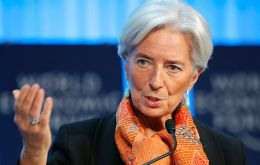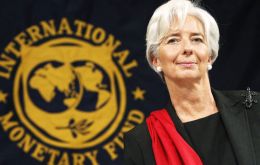MercoPress. South Atlantic News Agency
Economy
-
Saturday, June 6th 2015 - 08:00 UTC
Argentine debt climbed 5.4bn of Friday following Griesa's ruling favoring 'me too' bond holders

Argentina must pay US$5.4 billion to more than 500 “me-too” holders of defaulted debt before it can pay the majority of its creditors, a US judge ruled on Friday. Argentina anticipated it would appeal the ruling.
-
Friday, June 5th 2015 - 06:22 UTC
IMF calls on the Fed to keep rates on hold until first half of 2016

The International Monetary Fund urged the Federal Reserve to wait until the first half of 2016 to start raising short-term interest rates because the US economy remains subpar. In its annual checkup of the US economy released Thursday, the IMF said “the underpinnings for continued growth and job creation remain in place.”
-
Thursday, June 4th 2015 - 09:06 UTC
“No one can teach us how to make the economy grow”, blasts Cristina Fernandez

In a speech broadcasted live on Argentine national television and radio, President Cristina Fernández used most of the time to praise her government’s achievements insisting no one “can give us lessons on how to make the economy grow” and highlighting the role of the State.
-
Thursday, June 4th 2015 - 09:01 UTC
Brazil's fiscal consolidation insufficient to deal with debt levels, says Moody's

Brazil's debt levels will continue to increase through 2016 and remain high despite the government's fiscal consolidation efforts, potentially weakening the sovereign's credit profile, says Moody's Investors Service.
-
Thursday, June 4th 2015 - 08:54 UTC
Despite a contracting economy Brazil increases basic interest rate to 13.75%

Brazil raised interest rates to the highest levels in more than six years on Wednesday, extending a tightening campaign and leaving the door open for more hikes despite concerns that steep borrowing costs could deepen an expected economic recession.
-
Thursday, June 4th 2015 - 08:45 UTC
IMF gives Argentina more time to remedy quality of official CPI and GDP data

The International Monetary Fund extended the period given to Argentina to remedy its local statistical measurement tools, while recognizing the country has made advancements in the matter. The IMF directive board met on Wednesday in Washington to assess Argentina's statistical indexes.
-
Wednesday, June 3rd 2015 - 09:24 UTC
Falklands advances despite Argentine disruption and blockade efforts, says Acting Governor Sandra Tyler-Haywood

Falkland Islands' Her Honour the Acting Governor delivered on Tuesday his State of the Nation speech to the elected Legislative Assembly underlining progress and expansion achieved in the economy and community development, the UK resolute in defending the rights and wishes of the Falkland Islanders to develop their own natural resources, and despite Argentine disruption and blockade efforts, first oil is expected to be produced in 2019.
-
Wednesday, June 3rd 2015 - 08:18 UTC
Falklands faces fiscal 2015/16 with surplus budget, all industries prospering and 1.4% inflation

The Falkland Islands Legislative Assembly received on Tuesday the Appropriation Bill which allows for expenditure of £61.4M pounds in the fiscal year 2015/16, supported by revenues of £56.9M and a projected £4.9M from oil and gas exploration, thus completing another surplus year.
-
Tuesday, June 2nd 2015 - 06:18 UTC
Unemployment in Punta Arenas climbs to 4.4% in February-April period

Unemployment in Magallanes Region, extreme south of Chile climbed to 4.4% in the February-April period, which represents an increase of 2.3 percentage points over the same period a year ago, according to the latest release from the INE stats office.
-
Tuesday, June 2nd 2015 - 05:32 UTC
Argentina states 'lack of confidence' in mediator Pollack named by Judge Griesa

The Argentine government has turned down a plea from mediator Daniel Pollack to return to the negotiating table with holdout investors, with the Economy Ministry considering that talks with the speculative funds, so-called 'vulture funds', would be inappropriate given the behavior of the litigants.
